
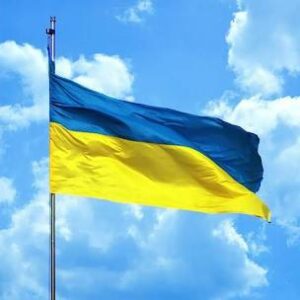
Pray for the suffering people of Ukraine and Gaza.
_________________
A Week on a Greek island
The conference ended and with my wife’s leave – I have a wonderful wife – I had something I had long wanted: a week to bum around on a Greek island.
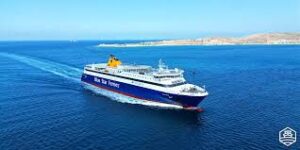
I felt prepared. I had learned enough Greek to get by. “Yes” in Greek is “Ne”, which sounds altogether too similar to English “No”. It’s often said while shaking the head sideways – the way we express “no”! “No” in Greek is “ochi” (guttural “ch”) – sounding not unlike English “OK” – often said while nodding the head up! Are we all clear on that? I decided to try never, ever to move my head at all. I also had learned something even more important: Που είναι η τουαλέτα? (Look it up.)
One more thing before the ferryboat docks: On my trips, did I dress in “clerics”? Never. If people know you’re a clergymen, there are usually one of two reactions: Either 1) They fall all over you: “O, Father, [this], O, Father, [that]”, and you get no break at all. Or 2) They freeze, and you never get to know them. I wanted to get acquainted with people just as if I was an actual person, both with the locals and the tourists. If anybody asked what I did I told them “I teach”, which is the truth, just not all of it. Thereby I learned many things I would not otherwise have known. For example, what Europeans (in those days) thought of 1) American people – they liked us, and 2) American government policies – uh, not so much, and 3) peanut butter – “disgusting”. These days? I don’t want to know. Believe me, I do not want to know.
And now it’s time to go below and exit the ferryboat.
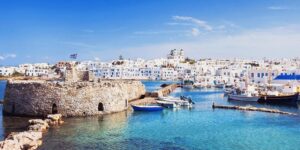
Paros
I had a room reserved on the island of Paros, in the middle of the Aegean. Why Paros? I can’t remember. It was lovely – low mountains, pretty villages and beautiful beaches, with that blue sea all around. A peaceful place. (This was in the old days before the shores got covered with big tourist hotels.) Nor can I remember why I decided to arrive two days before I had the room reservation. I’d find a room. No problem.
Problem! It was high season. I went from hotel to hotel, tourist house to tourist house asking “Domatia? Domatia?” only to hear over and over, “Ochi, no Domatia”. It was getting on towards evening. What to do?
I rented a little Yugo. (Does anybody here present remember Yugos? If you pushed hard on the accelerator,  oftentimes they moved, and if you drove very cautiously nothing important fell off. The noise and rattles you couldn’t escape.) I got a beach mat and a couple of blankets and a beach towel for a pillow, and drove to the nearest beach I could find, ‘cause it was now nearly dark. Nights were warm. I found a spot with few stones and tried to settle in – alone on an isolated beach in a place I didn’t know. It was kind of creepy. I knew that rural Wales, especially at dusk, can sometimes seem strangely ”alive” (I don’t know how else to describe it), and I wondered about Greece. Later I heard some quiet voices down the beach, so I wasn’t alone. I felt a little better.
oftentimes they moved, and if you drove very cautiously nothing important fell off. The noise and rattles you couldn’t escape.) I got a beach mat and a couple of blankets and a beach towel for a pillow, and drove to the nearest beach I could find, ‘cause it was now nearly dark. Nights were warm. I found a spot with few stones and tried to settle in – alone on an isolated beach in a place I didn’t know. It was kind of creepy. I knew that rural Wales, especially at dusk, can sometimes seem strangely ”alive” (I don’t know how else to describe it), and I wondered about Greece. Later I heard some quiet voices down the beach, so I wasn’t alone. I felt a little better.
And then a wonder began. Maybe what I describe here is commonplace for those of you who live in desolate places. But not for me.
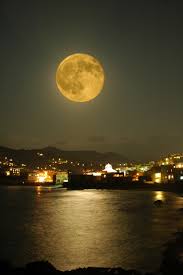
The clear Greek summer sky became velvety black such as we folks who live near the city never see, crowded with stars. I’d seen the Milky Way a couple of times since I was a boy, but never like this. The beach faced east. Hugging the horizon were the lights of Naxos, the next island to the east. Soon over Naxos emerged the smallest splinter of light, then bigger and bigger. By sheer chance I had hit the time of a full moon, which – no, “who” climbed regally like the goddess she is – first large and yellow, then progressively higher and smaller and whiter.
All night I watched the moon – partly because it was too beautiful to look away, partly because I couldn’t sleep. Even with blankets to cushion me, my middle-aged back hurt, so I woke often. I have read about ascetic saints who slept on boards or rocks. All I can say is: They’re welcome to it.
Some while later (I must have been asleep longer than it seemed), the moon was setting in the west, and in the east the horizon began to brighten.

If you have never seen a Greek island summer sunrise… Oh! First, great shafts of light appear, almost like blocks of light. Then suddenly the sun crashes over the horizon in full splendor. I can’t begin to describe it. You must go to a Greek island and see it for yourself.
The wonder of that night has lived in my mind and imagination ever since. I can see and feel it now, after all these years, as plainly as if I were there.
I still had one more night to go. What did I do that next day? I explored till I found a more agreeable beach on the other side of the island, with very soft sand and more people about. I think I must have slept much of that day and night away.
The third day I found the room I had reserved – or actually my travel agent (remember them?) had. In those days before internet and Travelocity, she couldn’t know what it was like. To say that tiny room was Spartan would be to overstate the case. But it had a bed! albeit rock hard as many Greek hotel beds tend to be. And pillows! And a toilet down the hall! And a screened door! And a view of the bay! And the cost (hang on) was $7 a night! Please forgive all the “!”s, but that is exactly how I felt.
Even today (or at least ten years ago, when I was last in Greece) if you knew where to look, you could find a pleasant room on a gorgeous, almost deserted beach for €25 (about $25) a night. Where? I’m not going to tell you. Nothing personal, but places like that should be kept secret, lest they be overrun with tourists and the cost skyrockets.

Now, I’m not going to say I didn’t spend time on the beach, because I did. Paros is the kind of place where you do that. Besides, I love the beach – that’s another reason I would make a terrible ascetic saint – the sand, the sun, the swimming, the rhythmic splashing of the waves – nor will I say I didn’t also enjoy some other sights – and that’s another reason [see above]. But for me a beach is above all a place to read. Often I‘ve wondered if I was the only person on the beach reading the works of Saint John Chrysostom.
What a life! at least for me. Church exploration in the morning, the beach most afternoons, the evening eating outdoors at a taverna. On a later visit to Greece, I never ate indoors for an entire month. It’s lovely – especially because Europe seems to have far fewer insects than we do, at least here in the Midwest.
Popular Orthodoxy
And now, besides absorbing the sun, I also absorbed Orthodoxy. I had got a compelling taste of it at the Conference on Crete. Now I saw Orthodoxy as ordinary people lived it.
On Paros, as on Crete, there were churches and chapels everywhere. In the towns there was a continual stream of men and women going in and out, lighting candles, saying prayers, crossing themselves, often with the fragrance of incense wafting out – sometimes with Western Europeans peering in, utterly perplexed.

On August 15, the feast of the Kimissis * of the Theotokos, I went to Divine Liturgy at the oldest church in Greece, “Panaghia * Ekatontapiliani”. (Unless you’re Greek, don’t waste your time trying to pronounce it. Ekatontapiliani probably means “100 doors”. I didn’t count.) It was built in the Fourth Century, at the direction of the Empress Helena when she stopped by on her trip to the Holy Land. The large church barely peeks out above the surrounding walls – built to protect from pirates and invaders, of which there have been many over the centuries. I’m sure people in such lands take their ancient history for granted, but I found it overwhelming. My home town, Cedarburg, Wisconsin, advertises our “historic downtown”, which means it goes back to the mid-1800s.
- “Kimissis” means “falling asleep”, the death and Entrance into Heaven of the Virgin Mary. “Panaghia (Παναγία, PANaGee-a, with a hard “g”) means “All-holy”. It’s a popular Greek title for her, derived from the ascription at end of most of our Litanies: “Calling to remembrance our all-holy, immaculate, most blessed and glorious Lady, the Theotokos and ever-virgin Mary”.
Courtesy of Algis Kemezys
P.S. July 17, 2025. An internet acquaintance has pointed out that, despite the title above, the service is actually the Paraklisis to the Theotokos.
Ekatontapiliani was still flourishing after all those sixteen centuries – not counting the years when pirates or whoever chased everybody out and the island lay desolate for a while. The church was filled to overflowing. I arrived during Matins, before Divine Liturgy, and could scarcely find a place to stand. Greek Navy men, leaving their ships docked in the harbor, were ushers, trying to jam ever more people in. It was hot in there, so I hung towards the back as the Liturgy went on… and on… and on… I remember a man worming his way through the Little Entrance procession, so he could get up front to light a candle. (“You’re not in Anglicanism any more, Dorothy.”)
Afterwards, there was a procession around the village with bishop and clergy in their vestments, and acolytes carrying incense and candles and I don’t know what all, with a marching band leading the way, as guns boomed from the ships in the harbor. Our Anglican celebrations were considerably more subdued, to put it mildly. But did I like this? Yes. It was alive.

On Sunday I went to Divine Liturgy at Longovarda Monastery up in the hills, celebrated by a long- bearded monk who looked even more ancient than the hills.
One afternoon in one of the villages I found a Baptism taking place: Children were running around, men going out and in for a smoke, old women chatting, some guy up in an elevated pulpit taking flash pictures, and the priest calmly immersing a naked screaming baby, as the godparents stood watchfully around, with the parents at a distance. Again I couldn’t help drawing contrasts. Compared to our sedate Anglican Baptisms, this seemed more like a village carnival.
On my last night on the island, here’s how I summed it up in my journal: “I love Greece! stars, breeze, smell of basil, thyme and salt air, sheep and goat bells, blue sky, cobalt sea, beckoning islands, beaches, Greek food, white churches all over with icons and smell of candles and incense, chapels and monasteries on hills. Asperity: the scenery is pure, stark, but the landscape is alive.” OK, I know that sounds like out of a travelers’ brochure, but it was exactly what I felt.
What I knew that pre-dawn morning when I first saw Greek islands was correct. I was hooked on Greece, and (though I understood scarcely a word) on what I saw of popular Orthodoxy. It was Christianity alive in a way I had never experienced before.
“That Face” Again
It was time to go back to Athens.
I have serious advice for you. Listen very carefully. Never ever travel the Aegean by ferryboat while the Meltemi (summertime high wind) is up. Even Greeks were hanging over the rails of the ship. I went down into the lower lounge, where somehow I got the rolling of my stomach in sync with the rolling of the boat, while people all around me were retching. It took days for my stomach, indeed my whole body, to stop swaying. As I walked in Athens, the sidewalks and buildings kept moving – up and down, back and forth.
And then it happened.
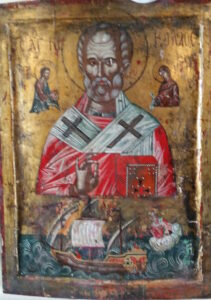
Remember that face of Bishop Irenaeos? how I wrote “don’t forget the face”? I did remember the face, and in an icon shop near the Athens cathedral I saw it again – in an icon of Saint Nicholas. I had to have that icon, that face, so I spent considerably more than I intended and bought it. * That night I wrote, “The Saint Nicholas icon has the happy holy look of the Cretan bishop.” Only later did I come to see that it was Irenaeos who looked like Nicholas. Good Orthodox bishops often come to take on the aspect of Saint Nicholas, the prototype Orthodox pastor. Though I didn’t yet know it, Saint Nicholas and that icon were about to lead me into the Orthodox Church. My life was about to be turned upside down again.
- Antiquities are not supposed to be taken out of Greece. However, I’m told that the icon shows evidence of having been written in the Seventeenth or Eighteenth Century. I’ve never had it “analyzed”.
My last Sunday in Greece I went to the Anglican Church in Athens, where I knew a few people. To my shock, I felt as if I had just left “The Church” and gone back to Anglicanism. I remember saying to myself, “You’d better get home fast”. I knew what I felt, but I also didn’t feel ready for this yet.
It was too late. The last words in my journal written just before we landed in Milwaukee were, “The Greek Church has a remarkable integration with everyday life – icons in buses, stores, taxis, houses. Church concerned with social needs of people. Seems to go far deeper than the Christian veneer of western Europe and even home. Why?”
When I got home my wife – after we had got done hugging and talking for a while – saw something different on my face. I no longer looked demoralized, distraught. As I told her about my trip, she asked “Do you want to be Orthodox?” I said “No”. I was lying. While I was in Greece, I had fallen in love with Orthodoxy.
There is yet another episode in the story of how I became Orthodox – no, of how Saint Nicholas made me Orthodox and founded Saint Nicholas Church, Cedarburg – so I guess we’ll finish up with that, next week. I tell it rather hesitantly lest people think I’m some sort of nutcase. However, I don’t want the story to be lost. So… one more Post in this series, and then we’ll get back to saints and seasons and the like.
Next week: Saint Nicholas speaks.
Week after Next: Independence Day
I love your writing style, Father!
And l share your love of Greece!